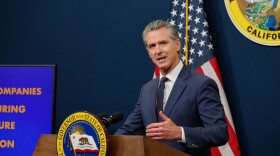MELISSA BLOCK, host:
From NPR News, this is ALL THINGS CONSIDERED. I'm Melissa Block.
MICHELE NORRIS, host:
And I'm Michele Norris.
The Iraq hearings on Capitol Hill have been not surprisingly front-page news in Baghdad. Iraqi television aired live coverage of the testimony by General David Petraeus and Ambassador Ryan Crocker both yesterday and, again, today.
Baghdad newspapers focused largely on the Petraeus recommendation for a drawdown of U.S. forces. While the Iraqi government largely welcome the assessments of Petraeus and Crocker, ordinary Iraqis seemed much more critical.
NPR's Jamie Tarabay reports from Baghdad.
JAMIE TARABAY: Ayad Mahdi(ph), a garage owner, stayed up late last night to watch the Petraeus and Crocker testimony. He said the scenario painted in Washington is the total opposite of what he sees on the ground.
Mr. AYAD MAHDI (Garage Owner, Iraq): (Through translator) Many times, they said the security is better. It is not that the situation has improved, but that Iraq is now completely devastated. Young people are unemployed. The economy is destroyed. The infrastructure is gone.
TARABAY: He claims American forces only respond when they themselves are attacked, and do little, if anything, to protect Iraqi civilians.
Mr. MAHDI: (Through translator) All Iraqis are watching, trying to understand what the solution is. We don't see any change in the scenario. There's no connection at all to what is happening here and what is being reported in Washington.
TARABAY: Mahdi's garage in east Baghdad is located in an area near the Tigris River, now grimly known as a dumping ground for the bodies of people killed in sectarian violence.
In his report to Congress, General Petraeus said sectarian killings were down compared to last year - the bloodiest since the war began. But the average number of bodies Baghdad's morgue receives every month has remained high, at around 690 for each of the past six months.
Sitting next door to Mahdi's garage is mechanic Imad Abbit(ph), his clothes smeared with grease. He said he also watched Monday's hearings from beginning to end and has his own questions to ask.
Mr. IMAD ABBIT (Mechanic): (Through translator) Where is the improvement? Bring anyone from the Iraqi government here and you'll hear the sound of bullets. We don't see anyone from the government serve the people. They just sit in their chairs and the poor Iraqi who voted for them is the victim.
TARABAY: Most Iraqi politicians were quick to respond to the hearings in Washington. Ali Dabbagh, a spokesman for Prime Minister Nouri al-Maliki, said he agrees with Petraeus and Crocker about the dangers of an early U.S. pullout.
Mr. ALI DABBAGH (Spokesman, Iraqi government): (Through translator) A quick withdrawal will create a power vacuum, which wouldn't benefit anyone. It would certainly not the America's interest for that to happen.
TARABAY: However, Dabbagh also acknowledged the political failings outlined by Ambassador Crocker.
Mr. DABBAGH: (Through translator) There's been weakness in the government's performance. We should confess there were mistakes.
TARABAY: But Sunni lawmaker, Salim Abdullah, criticized Ambassador Crocker, saying he glossed over the political problems and spoke only in generalities.
Mr. SALIM ABDULLAH (Sunni Lawmaker): (Through translator) I believe it's in the interest of the American government to show that there is political progress, so Crocker didn't talk about the crisis, about the parties, which boycott the government or how to get over these difficulties.
TARABAY: Another politician who chose to focus on the positive statements about the situation from Crocker and Petraeus was Iraqi national security advisor Mowaffaq al-Rubaie. But Rubaie went further than General Petraeus by claiming that more than 80 percent of Iraq's army now has the capability to take the lead in combat operations. Rubaie also made this claim.
Mr. MOWAFFAQ AL-RUBAIE (Iraq's National Security Advisor): (Through translator) Now it's about 500,000 soldiers and police who've been given the best military training.
TARABAY: While Petraeus said the Ministries of Interior and Defense now employ nearly half a million Iraqis, the number of serving Iraqi troops and security officers is under 160,000.
Mr. ABBIT: (Foreign language spoken)
TARABAY: Back at his garage, Imad Abbit says he does see more Iraqi security forces on the streets than he used to. But all they seem to do, he says, is stand in groups around checkpoints, passing the time. He has no confidence they'll be able to maintain security once U.S. troops leave, no matter how many of them there are.
Jamie Tarabay, NPR News, Baghdad. Transcript provided by NPR, Copyright NPR.






